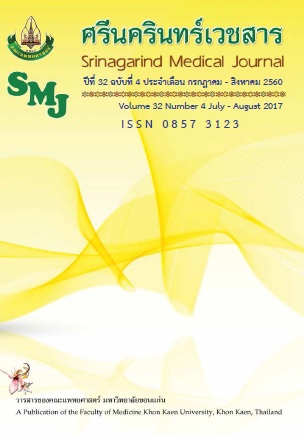The Effectiveness of Screening and Sufficiency Health Promotion on Quality of Life among Elders with Chronic Diseases in Semi-urban context, Yasothon Province
Keywords:
Sufficiency Health Promotion, Quality of life, Elders with Chronic Disease, การส่งเสริมสุขภาพแบบพอเพียง, คุณภาพชีวิตผู้สูงอายุโรคเรื้อรังAbstract
Background and Objective: Physiological ageing of the organ functions in elderly people is associated with the risk of chronic diseases. The screening and Sufficiency Health Promotion Programs based on community context, culture and lifestyle can be increased the performance of detecting the high-risk group. So, it can be improved the quality of life of the older.
Methods: This study was divided into two steps. The first step: the elderly group was screened for chronic diseases and was recruited into the next step. The second step was a one-group pretest-posttest design.
Eighty–five cases received the Sufficiency Health Promotion Program for 10 months. The inferential statistic including paired sample t-test was used to analyze the data.
Results: The results of the screening showed that the most common chronic diseases in elderly people were hypertension (14.9%) and diabetes with hypertension (10.26%). After the program had been used, the mean score of the quality of life was at a high level with statistically significant difference (p<.05). However, the mean score of physical domain was not statistically significantly difference.
Conclusion: The screening for chronic diseases combined with the Sufficiency Health Promotion Programs based on community context, culture and lifestyle could be improved the quality of life among the elderly people.
ประสิทธิผลของการตรวจคัดกรองร่วมกับการส่งเสริมสุขภาพแบบพอเพียงต่อคุณภาพชีวิตผู้สูงอายุโรคเรื้อรังในบริบทสังคมชนบทกึ่งเมือง จังหวัดยโสธร
หลักการและวัตถุประสงค์: วัยสูงอายุเป็นวัยที่มีการเปลี่ยนแปลงการทำหน้าที่ของร่างกายลดลงทำให้เสี่ยงต่อการเกิดโรคเรื้อรัง ดังนั้นการตรวจคัดกรองจะช่วยเพิ่มประสิทธิภาพในการค้นหาประชากรกลุ่มเสี่ยงร่วมกับการส่งเสริมสุขภาพแบบพอเพียงที่สอดคล้องกับบริบทของสังคม วัฒนธรรม ความเชื่อ วิถีชีวิต ตลอดจนขนบธรรมเนียมประเพณี รวมไปถึงการปรับสิ่งแวดล้อมจะช่วยให้ผู้สูงอายุมีคุณภาพชีวิตที่ดี
วิธีการศึกษา: การศึกษาครั้งนี้แบ่งเป็น 2 ขั้นตอน ขั้นตอนที่ 1 ทำการตรวจคัดกรองโรคเรื้อรังในกลุ่มผู้สูงอายุและคัดเลือกเข้าทำการศึกษาในขั้นตอนที่ 2 ซึ่งเป็นการศึกษาแบบกึ่งทดลองกลุ่มเดียวประเมินก่อนและหลัง กลุ่มตัวอย่างจำนวน 85 ราย ให้การส่งเสริมสุขภาพแบบพอเพียงเป็นระยะเวลา 10เดือนวิเคราะห์ข้อมูลโดยใช้สถิติ Paired t-test
ผลการศึกษา: ผลการตรวจคัดกรองพบว่า ผู้สูงอายุที่ป่วยด้วยโรคเรื้อรังพบมากที่สุดคือ โรคความดันโลหิตสูงร้อยละ 14.96 รองลงมาเป็นโรคเบาหวานและโรคความดันโลหิตสูงร้อยละ 10.26 คะแนนเฉลี่ยคุณภาพชีวิตโดยรวมหลังการส่งเสริมสุขภาพแบบพอเพียงเพิ่มสูงขึ้นอย่างมีนัยสำคัญทางสถิติ (p < .05) ส่วนคะแนนเฉลี่ยคุณภาพชีวิตด้านร่างกายก่อนและหลังการส่งเสริมสุขภาพแบบพอเพียงไม่มีความแตกต่างกัน
สรุป: การตรวจคัดกรองโรคเรื้อรังร่วมกับการส่งเสริมสุขภาพแบบพอเพียงที่สอดคล้องกับบริบทของสังคมช่วยเพิ่มคุณภาพชีวิตผู้สูงอายุ




